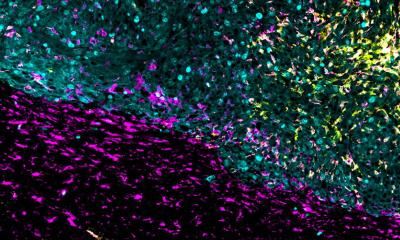News • Focal therapy study
New prostate cancer treatment to reduce risk of impotence
Focal treatment involves treating only the tumor in the prostate and not the entire gland. When surrounding tissue and nerves are spared, there are fewer side effects. The method is being evaluated in a research study at Karolinska University Hospital, which is the first hospital in Scandinavia to use it.

Image source: Karolinska University Hospital; photo: Mikael Wallerstedt
Prostate cancer is the most common form of cancer, killing around 2200 Swedish men each year. However, many of the tumors are benign and never need treatment. Malignant tumors are usually treated with radiotherapy or by surgery, in which the entire prostate gland is removed. This has a good chance of prolonging patients' lives, but side effects such as urine leakage and impotence often follow.
Now a new method may be available for cancer patients in the Stockholm region who need treatment for prostate cancer. "We are evaluating so-called focal therapy in a randomized clinical trial. The new method will be compared with the conventional methods we already use at the hospital, i.e., surgery and radiation," says Anna Lantz, Consultant Urologist and Associate Professor of Urology at Karolinska University Hospital.
Not having to remove the entire prostate is a major advantage. Muscles and nerves around the glands are spared to a greater extent, which gives men with prostate cancer a better chance of good function and quality of life
Anna Lantz
Focal therapy is suitable for patients with treatment-requiring tumors in a smaller area of the prostate. The technique is used in the UK, Germany, the US, and Australia. In focal treatment, needles are inserted through the interstitial space, into the prostate gland and placed around the tumor. The tumor tissue is killed by passing electricity between the needles, causing cell death without any heat generation. The patient is sedated during treatment but can usually go home the same day as the procedure.
In September, Anna Lantz performed the first focal treatment for prostate cancer at Karolinska University Hospital with the support of Professor Mark Emberton, a British urologist and specialist in minimally invasive methods for prostate cancer. "The procedure went well, exactly as planned. We are now welcoming participants from across the Stockholm region for assessment and hope to open a further treatment site at Danderyd Hospital soon. A total of 184 patients will be included in the study," says Anna Lantz.
The diagnosis of prostate cancer has improved greatly in recent years as MRI, magnetic resonance imaging, can provide more detailed images of the exact position of tumors in the prostate. This is a prerequisite for focal treatment. "Not having to remove the entire prostate is a major advantage. Muscles and nerves around the glands are spared to a greater extent, which gives men with prostate cancer a better chance of good function and quality of life," says Anna Lantz.
No comparative studies are available yet, but the small studies published so far have shown that the risk of impotence and urinary leakage is more than halved with focal treatment compared to conventional surgery.
Source: Karolinska University Hospital
30.10.2022





